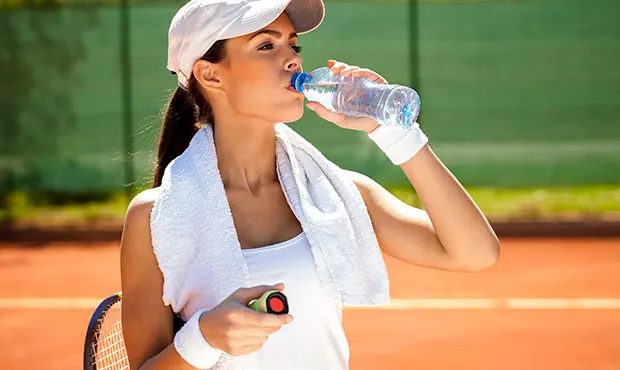
Summer is here, and temperatures are rising to levels that can be hard to enjoy, especially if you're exercising or participating in a competitive sport like tennis. Now, more than ever, proper hydration is essential.
About 60 percent of our body weight is water, which has many important functions, such as lubricating the joints, temperature regulation and transporting nutrients through the entire body.
The minimum daily fluid-intake recommendations are 64 ounces of water for women and 80 ounces for men. Athletes need twice as much, about 1 ounce of water per 1 pound of bodyweight. But it's not always easy to know the correct level of hydration, because we all have different needs, live in different environment and have different lifestyles. We break it down.
How to Determine if You're Hydrated
Thirst is not a good indicator of hydration status. If you're feeling thirsty, you're probably already dehydrated, which can cause your performance to drop 10 percent or more.
A better way to determine whether you're properly hydrated is to observe the color of your urine, which should be almost transparent or very lightly colored.
Even a slight 2 percent dehydration makes your temperature go up, heart beat faster and feel more tired. Whatever activity you're involved in will seem more difficult.
Mentally, you'll lose concentration, accuracy, technique and timing—which are critical in a competitive sport like tennis.
How Much is Too Much?
Like many things in life, the conventional wisdom that "more is better" is false, even with hydration.
There's a point when drinking too much water can flush all the beneficial nutrients out of your system. Again, observing your urine will guide you accurately. When you reach the almost transparent color, you are doing great—no need to increase your water intake.
Water is the best fluid to ingest. If you want change, club soda, seltzer, mineral water or flavored water is great, too.
Hydrating Foods
When you need extra calories and nutrients during prolonged training or recovery, fruit and vegetable juices will do an excellent job. Products with 100 percent natural juices are the best, preferably freshly squeezed.
Snacking on fruits and vegetables will deliver small amounts of fluids as well, in addition to valuable nutrients and phytochemicals. If you can, choose a whole food plant-based snack for maximum benefits, rather than a cookie, chocolate or other processed, nutrient-empty snacks.



